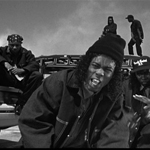 CB4 is the comedic story of a fictional West Coast gangsta rap trio out of not-real Locash, CA. They exist in the same world as N.W.A (Ice Cube and Eazy E both appear as themselves in documentary style interview segments) but also they’re kind of supposed to be N.W.A. They dress like them, they have a similar “world’s most dangerous group” image, their videos are shot-for-shot imitations of N.W.A videos, and their hit song “Straight Outta Locash” is done over the music from “Straight Outta Compton,” but nobody accuses them of being a rip-off. Their song is not as good, in my opinion. They copy Cube’s line “Straight outta Compton, crazy motherfucker named Ice Cube” not just once, but before each verse. Watering it down.
CB4 is the comedic story of a fictional West Coast gangsta rap trio out of not-real Locash, CA. They exist in the same world as N.W.A (Ice Cube and Eazy E both appear as themselves in documentary style interview segments) but also they’re kind of supposed to be N.W.A. They dress like them, they have a similar “world’s most dangerous group” image, their videos are shot-for-shot imitations of N.W.A videos, and their hit song “Straight Outta Locash” is done over the music from “Straight Outta Compton,” but nobody accuses them of being a rip-off. Their song is not as good, in my opinion. They copy Cube’s line “Straight outta Compton, crazy motherfucker named Ice Cube” not just once, but before each verse. Watering it down.
One of the more brazen boasts is “I fucked your sister, I fucked your cat / I would’ve fucked your mom but the bitch is too fat,” which is absurd enough, sure, but it’s not as deviously clever as Eazy’s actual line, “Straight outta Compton / is a brother that’ll smother your mother / and make your sister think I love her.”
One difference from N.W.A: they don’t have an exploitative white manager from outside the world of hip hop. They have Trustus (Willard E. Pugh, THE COLOR PURPLE, ROBOCOP 2).
Another one: these guys aren’t exaggerated characters based on their real lifestyles. They’re straight up phonies dressing up like gangstas as a gimmick after their corny Native Tongues copycat act didn’t catch on. And they, uh, pretend they were in prison, which they weren’t , and that gets them into some awkward situations. Hmm.
To me the greatest moment in the movie is right at the beginning when we see very authentic music doc footage (from “a rapumentary by A. White”). The members of the group make their way to the stage, smoke machines going, crowd chanting. They take the microphones, and it pans across, their stage names written on the screen in a stencil font, and we find out that the DJ (played by Deezer D, who was in COOL AS ICE) is named…
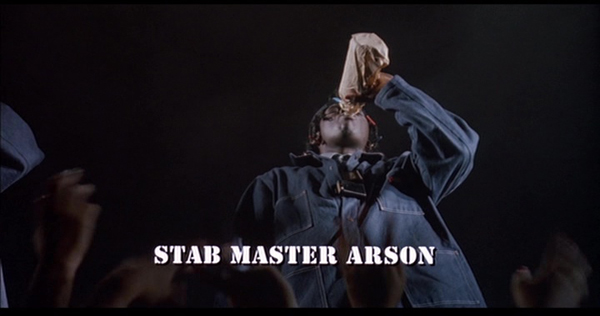
I mean, that’s a good name in my opinion. The others are MC Gusto (Chris Rock) and Dead Mike (Allen Payne, NEW JACK CITY, JASON’S LYRIC).
Most of the movie is not mockumentary style, but they get to use that technique when needed because of the doc being made by a dorky white director played by Chris Elliott (MANHUNTER) in his usual fawning, clueless persona. He’s a funny character because he doesn’t pretend to be street, and seems unaware of not fitting in with these guys, or annoying them with his probing questions like “Do you guys like sandwiches, do you like fondue?” He also makes no attempt to hide his tourist status. When the Jeep gets shot at with him in the passenger seat he looks into the camera and says, delighted, “It’s my first drive-by!”
Director Tamra Davis was later known for BILLY MADISON and HALF BAKED. At this point she’d done GUNCRAZY starring Drew Barrymore. But I imagine she qualified for this because she’d directed videos by Tone Loc, MC Lyte, Young MC and (most applicable here) two by N.W.A affiliate The D.O.C.:
So she’s had plenty of exposure to their scene and imagery, good experience for a parodist. (Widely known trivia: she also happens to be married to Mike D of Beastie Boys.)
At this point Chris Rock was known from SNL, he’d had maybe the funniest scene in I’M GONNA GIT YOU SUCKA, and a well-received dramatic role in NEW JACK CITY, and been in BOOMERANG. But this was the first Chris Rock movie, not just as star but as writer and producer, and clearly a personal expression of his love for hip hop. He co-wrote it with Nelson George, who had written the Tommy Davidson movie STRICTLY BUSINESS, but was best known for writing about black music in Billboard, The Village Voice and his many books. A few years later he wrote a really good one called Hip Hop America.
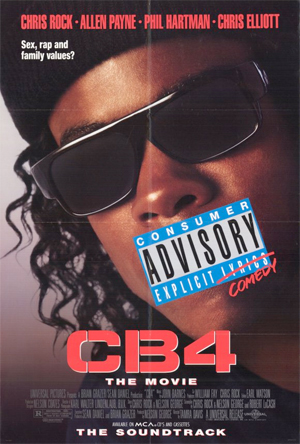 So Rock’s character Gusto is not the ignorant boy n tha hood he represents himself as, he’s actually a nice kid named Albert who loves hip hop and dreams of leading his friends into a career together. This was a year after WAYNE’S WORLD, and to show that they’re another version of those lovable heavy metal dorks they have their own spin on the famous “lip-synching ‘Bohemian Rhapsody’ in the car” scene. In their version it’s Run-DMC’s “King of Rock,” and they have to double up on DMC’s lines because it’s not fair for one of them to have to be Jam Master Jay and just sit there. They wear the proper hats and glasses, but then the tape gets spit out and ruins the moment.
So Rock’s character Gusto is not the ignorant boy n tha hood he represents himself as, he’s actually a nice kid named Albert who loves hip hop and dreams of leading his friends into a career together. This was a year after WAYNE’S WORLD, and to show that they’re another version of those lovable heavy metal dorks they have their own spin on the famous “lip-synching ‘Bohemian Rhapsody’ in the car” scene. In their version it’s Run-DMC’s “King of Rock,” and they have to double up on DMC’s lines because it’s not fair for one of them to have to be Jam Master Jay and just sit there. They wear the proper hats and glasses, but then the tape gets spit out and ruins the moment.
That’s not the only scene that establishes this as a love letter to the hip hop culture and history. That already happened in the opening credits montage, a pan through a museum of hip hop artifacts (records, jackets, gold chains, glasses, sneakers, turntables and newspaper articles from Grandmaster Flash, Biz Markie, the Fat Boys, Run-DMC, etc.) set to “The Show” by Doug E. Fresh (an 8 year-old song at that point, ancient in hip hop years).
CB4 are actually middle class kids and they have families that care about them. Albert’s dad is Art Davis from DIE HARD 2, who flips shit at him Robin Harris or John Witherspoon style:
“Why aren’t you at school?”
“It’s Saturday, Pop.”
“So? Go look at a school.”
Stab Master Arson is actually Otis, who takes good care of an army of little sisters. I noticed one of them is the controversial LOST WORLD gymnast Vanessa Lee Chester. He promised her he’d sew her a new dress.
But then they come up with this CB4 gimmick, they put on jheri curl wigs and prison inspired fashion, they carry around 40s. Once they do that they blow up, partly with the help of a white politician (Phil Hartman) who grandstands on banning their music and trying to stop them from performing a hit song. This is familiar from many rock ‘n roll biopics, but also from the history of hip hop, as similar controversies were drummed up against N.W.A, Ice-T, 2 Live Crew and obscure Public Enemy affiliate Sister Souljah. Another running gag involves the politician’s son whose fandom inspires the whole thing. This parallels Tipper Gore’s censorship crusade after hearing her daughter listen to “Darling Nikki” from Purple Rain, but it’s also what seemed to be the ultimate fear of these types of white authority figures at the time: they’re coming for our children. (See Ice-T’s Home Invasion for more information.)
I love that the controversial song is called “Sweat From My Balls,” and is performed while the crowd bounces around big brown beach balls. It really emphasizes what a silly battle is being waged here. The censors look extra-doofusy, because what kind of a chump would take this stupid shit seriously enough to be outraged by it? CB4 are correct, standing up for their right to free speech and expression (and taking advantage of the situation for publicity), but it’s funny that the fight is over something so idiotic.
While spending a credibility-buffering night in jail Gusto brings up a talking point that was popular among rappers and rap fans at that time, and still comes up occasionally: they’re coming after us, but those heavy metal guys are biting the heads off of bats. I think the line is meant sincerely, not satirically. I’ve never liked that argument, because it’s just a selfish “we’re not as bad as the other guys” defense that goes against the larger truth that people have the right to create and listen to music no matter what somebody else thinks about it. It’s also sharing the same hysterical misunderstandings as their censors. Ozzy Osbourne legendarily bit the head off of a dove at a meeting with record company executives, and also off a dead bat that a fan threw on stage (and he thought was a toy). But come on, that’s only two animals. Who hasn’t head-bit a couple times?
Okay, I guess most of us haven’t, but one infamous incident in 1982 is hardly representative of all rock music.
Another reason the line falls flat is because Ozzy-paranoia has already been parodied earlier in the movie, when Shaquille O’Neal defends CB4 with an exaggerated version of that same dumb argument in an interview. “I think it’s kinda unfair that Cell Block 4 is being picked on like that,” he says, “because at these other concerts when they have rat heads and cat heads, and cats being bit off, and people spittin in the cup and passin it around the audience and, you know, gettin it back and drinkin it, you know.”
The real rappers in the interview segments aren’t always as supportive of CB4. Flavor Flav says “They kinda wack.” Eazy-E criticizes the length of Gusto’s jheri curl.
Cube and Eazy’s interviews are separate, of course, because at this point N.W.A was broken up and hated each other. Cube left the group and feuded with them after the first album, but by this point Dre had also left for Death Row Records and dissed Eazy and manager Jerry Heller on The Chronic. Eazy returned fire with the befuddlingly titled It’s On (Dr. Dre) 187um Killa EP. (Cold 187um is one of the producers of the EP, and a member of the Dre-produced group Above the Law, but I still don’t understand his name in the title.)
Anyway, Eazy’s brief scene is historic for being his only appearance in a feature film.
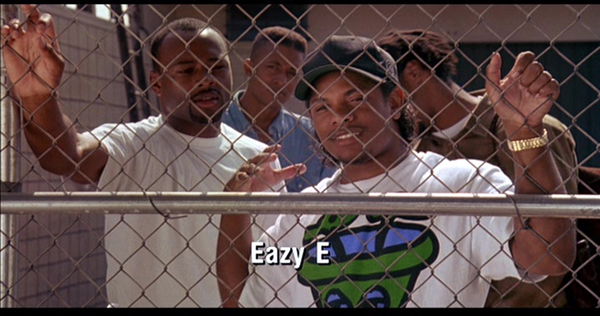
There’s one plot point that’s weirdly prophetic: MC Gusto steals his stage name from a real criminal (introducing Charlie Murphy). I don’t know of that being a thing back then, but it was later. 50 Cent is named after Kelvin “50 Cent” Martin, an ’80s era street thief from the Bronx. The rappers Freeway and Rick Ross both took their names from the infamous ’80s cocaine kingpin “Freeway” Rick Ross. Unlike in CB4 the real guys didn’t try to kill them, but the ex-trafficker Ross did try unsuccessfully to sue the rapper Ross.
Sometimes Rock seems to be going for a grounded movie for intelligent people about things that are personal to him, as he’s done much more successfully in the recent TOP FIVE. To me, that’s the weak part of the movie. He has a normal girlfriend (Rachel True from THE CRAFT) who’s disappointed in his new fakeness and ignorant persona, and he gets schooled by a journalist from The Source (Theresa Randle), a representation of the Strong Black Woman. I feel like this was the burden of a black artist, and especially one who’s a hip ho p fan, of that time. Social responsibility and “positivity” came before funny. Gusto had to be “likable” Albert. The ridiculous songs had to be put-ons. It’s well-meaning and understandable but I think it accidentally results in the real life good guys (the women who won’t put up with this shit) seeming like wet towel parade-pissers. They are correct but they ruin the fun and bum us out by being that serious part that they always felt they had to put into even an Adam Sandler or Chris Farley movie in the ’90s. The part where they act like the audience really gives a shit if this cartoon character straightens out his relationships.
So it’s often the broad stuff that works best, like the scene where a thug confronts their flaky manager Trustus about money he’s owed… at Trustus’s open casket funeral. “I want my money, funeral or no funeral I want my money!” he yells as he gives the corpse a black eye.
In the section where the group breaks up and goes solo there’s a pretty good dumb joke about the popularity of Afrocentric rap at that time, and Gusto deals with his failed career by sitting in front of the TV with malt liquor bottles of increasing size.
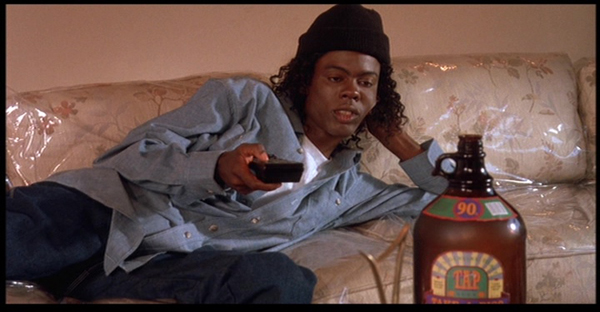
Then he parodies his own crack smoking scene from NEW JACK CITY.
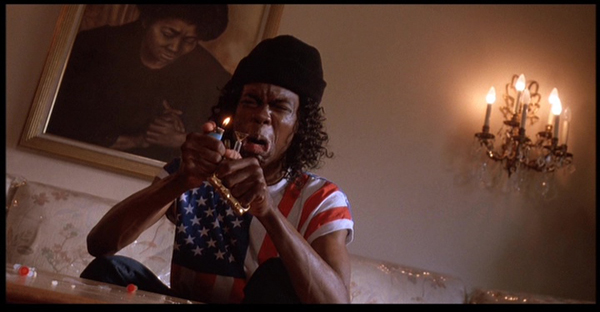
(During the credits there’s an outtake with Isaac Hayes, referencing their scene from I’M GONNA GIT YOU SUCKA.)
I want to mention that there are some instances of what could be classified as homophobic humor. I think it’s more about the characters being literally homophobic, afraid of homosexuality. I actually find the scene where Dead Mike works at a gay phone sex line pretty funny. He answers the phone and with zero enthusiasm says, “Yeah yeah, I’m lickin your balls. Yeah, you got big balls. You got king kong balls– I don’t know, you got big balls.”
Later, in a scene that’s a little too far-fetched and contrived for my tastes, MC Gusto is disguised as a sexy groupie (long story) and (I forget which one of the other guys) moves toward him in slow motion, closing his eyes, parting his lips, tempted to make out with him. Is the joke here only “ha ha, gross,” or does it say something about these men being attracted to the signifiers of female sexuality, like lingerie and thick lipstick, more than actual people? Maybe I’m reading too much into it. It’s not really funny. But maybe it’s interesting?
The soundtrack is pretty random, but good. It includes Public Enemy (“Livin’ in a Zoo”), KRS-One (“Black Cop,” as if we didn’t already own Return of the Boom Bap), DJ Hurricane featuring Beastie Boys, Fu-Schnickens, Blackstreet. And yes, MC Ren. So you got three N.W.A members represented in the movie.
The CB4 songs aren’t all that funny, but at least they’re musically legit. Gusto sounds alot like Eazy-E when he raps. It’s not actually Chris Rock rapping, it’s a Compton rapper named Hi-C:
And Dead Mike is Daddy-O from Stetsasonic:
https://youtu.be/bfvJAcou96s
You know what, I don’t think people really know Stetsasonic anymore. They were pretty big back then, played on Yo! MTV Raps alot, very respected. Prince Paul was their DJ before he met De La Soul and produced Three Feet High and Rising. So was Frukwan, who was later in Gravediggaz with Paul. Daddy-O was featured in the all-star “Self Destruction” song and referenced in “Night of the Living Baseheads” by Public Enemy. I have I think three albums by Stet that hold up. But I don’t think people really mention them anymore. I’m gonna go ahead and declare them today’s most underrated golden age group.
Those two also produced the songs, so they sound pretty good. But the story is about the group learning their lesson, dropping the act and being themselves. So how do they show them being a legit, not purposely stupid group at the end? Oh, they just have them cover “Rapper’s Delight.” I guess that’s probly a good approach.
to be continued…


























August 10th, 2015 at 11:43 am
Good stuff, Vern. I’m currently working on a book exploring the “dueling” movies phenomenon. (Wyatt Earp/Tombstone, Volcano/Dante’s Peak, etc.) CB4 & Fear of a Black Hat got cut because of length, but will definitely appear in the second volume.